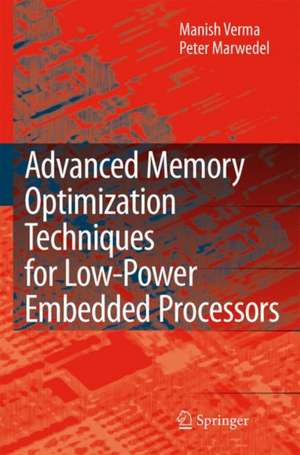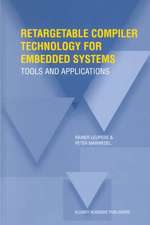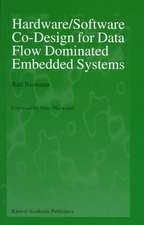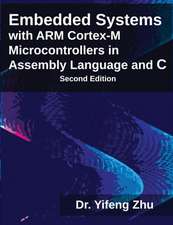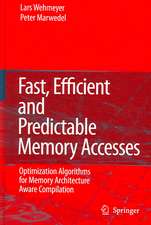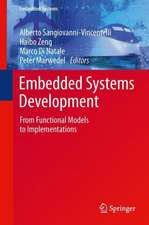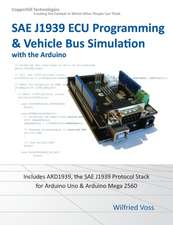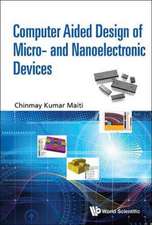Advanced Memory Optimization Techniques for Low-Power Embedded Processors
Autor Manish Verma, Peter Marwedelen Limba Engleză Hardback – 9 mai 2007
| Toate formatele și edițiile | Preț | Express |
|---|---|---|
| Paperback (1) | 635.80 lei 6-8 săpt. | |
| SPRINGER NETHERLANDS – 19 oct 2010 | 635.80 lei 6-8 săpt. | |
| Hardback (1) | 642.03 lei 6-8 săpt. | |
| SPRINGER NETHERLANDS – 9 mai 2007 | 642.03 lei 6-8 săpt. |
Preț: 642.03 lei
Preț vechi: 755.33 lei
-15% Nou
Puncte Express: 963
Preț estimativ în valută:
122.87€ • 127.80$ • 101.43£
122.87€ • 127.80$ • 101.43£
Carte tipărită la comandă
Livrare economică 15-29 aprilie
Preluare comenzi: 021 569.72.76
Specificații
ISBN-13: 9781402058967
ISBN-10: 1402058969
Pagini: 161
Ilustrații: XII, 188 p.
Dimensiuni: 155 x 235 x 12 mm
Greutate: 0.46 kg
Ediția:2007
Editura: SPRINGER NETHERLANDS
Colecția Springer
Locul publicării:Dordrecht, Netherlands
ISBN-10: 1402058969
Pagini: 161
Ilustrații: XII, 188 p.
Dimensiuni: 155 x 235 x 12 mm
Greutate: 0.46 kg
Ediția:2007
Editura: SPRINGER NETHERLANDS
Colecția Springer
Locul publicării:Dordrecht, Netherlands
Public țintă
ResearchCuprins
Related Work.- Memory Aware Compilation and Simulation Framework.- Non-Overlayed Scratchpad Allocation Approaches for Main/Scratchpad Memory Hierarchy.- Non-Overlayed Scratchpad Allocation Approaches for Main/Scratchpad + Cache Memory Hierarchy.- Scratchpad Overlay Approaches for Main/Scratchpad Memory Hierarchy.- Data Partitioning and Loop Nest Splitting.- Scratchpad Sharing Strategies for Multiprocess Applications.- Conclusions and Future Directions.
Notă biografică
Prof. Peter Marwedel has published numerous books with Springer
Textul de pe ultima copertă
The design of embedded systems warrants a new perspective because of the following two reasons: Firstly, slow and energy inefficient memory hierarchies have already become the bottleneck of the embedded systems. It is documented in the literature as the memory wall problem. Secondly, the software running on the contemporary embedded devices is becoming increasingly complex. It is also well understood that no silver bullet exists to solve the memory wall problem. Therefore, this book explores a collaborative approach by proposing novel memory hierarchies and software optimization techniques for the optimal utilization of these memory hierarchies. Linking memory architecture design with memory-architecture aware compilation results in fast, energy-efficient and timing predictable memory accesses.
The evaluation of the optimization techniques using real-life benchmarks for a single processor system, a multiprocessor system-on-chip (SoC) and for a digital signal processor system, reports significant reductions in the energy consumption and performance improvement of these systems. The book presents a wide range of optimizations, progressively increasing in the complexity of analysis and of memory hierarchies. The final chapter covers optimization techniques for applications consisting of multiple processes found in most modern embedded devices.
Advanced Memory Optimization Techniques for Low Power Embedded Processors is designed for researchers, complier writers and embedded system designers / architects who wish to optimize the energy and performance characteristics of the memory subsystem.
The evaluation of the optimization techniques using real-life benchmarks for a single processor system, a multiprocessor system-on-chip (SoC) and for a digital signal processor system, reports significant reductions in the energy consumption and performance improvement of these systems. The book presents a wide range of optimizations, progressively increasing in the complexity of analysis and of memory hierarchies. The final chapter covers optimization techniques for applications consisting of multiple processes found in most modern embedded devices.
Advanced Memory Optimization Techniques for Low Power Embedded Processors is designed for researchers, complier writers and embedded system designers / architects who wish to optimize the energy and performance characteristics of the memory subsystem.
Caracteristici
The complete application, including data variables and code segments, is optimized Comprehensive architecture-level exploration for real-life applications Demonstration of architecture-aware compilation techniques
